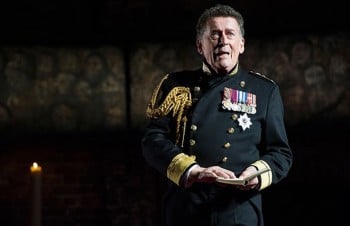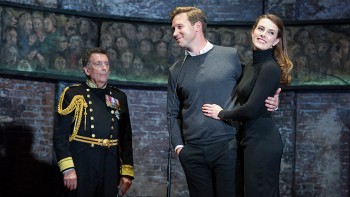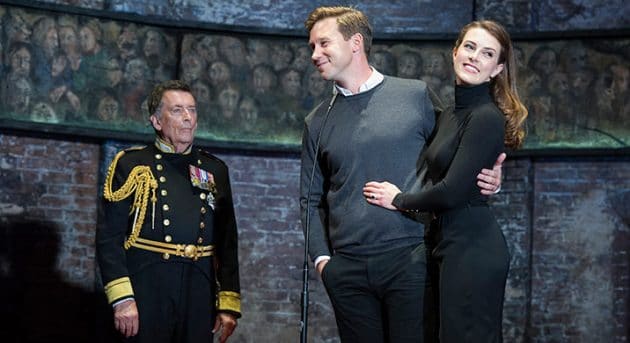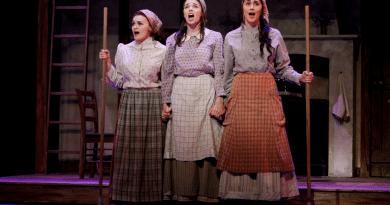On King Charles III, Hamilton, and Australian audiences cutting down tall poppies
On the opening night of the UK’s Almeida production of King Charles III in Sydney, a uniquely Australian reaction rippled through the audience. “It’s Will and Kate,” said a character, and laughter erupted from the crowd, the laughter of anticipation. The very act of introducing the young royals on stage seemed to signal one thing only – an upcoming skewering, a thorough take-down.
In Sydney, King Charles III became a comedy. Under the same curious and confident direction by Rupert Goold as it was overseas, (with Whitney Mosery overseeing the local production) the play was read by many in the theatre-literate audience as a lukewarm satire of ineffectual and outmoded institutions.

And of course it did. This is Sydney, the home of The Wharf Revue, a 16-year long sketch comedy tradition that pokes merciless fun at government, policymakers, and talking heads. We don’t grant our politicians any respect on stage. If they are elevated above us, framed by a proscenium, we’ve taught ourselves to expect these proverbial tall poppies to be soundly cut down as the public screams for their destruction.
We don’t want to take our leaders any more seriously than we absolutely have to.
We’re a country of How Green Was my Cactus and Keating!, of Mad as Hell and “Howard DJs like a mad c**t.” There’s no space in this cultural appetite to give any consideration to the elevated problems of the monarchy; if Charles is struggling with reigning and Harry finds his privilege unbearable, as they do in this play, isn’t that just hilarious?
I first saw King Charles III in New York City last November, another Almeida replica production, featuring the original UK cast. There, the audience sat reverent; when a familiarly-coiffed ghost appears with a riddle of a prediction, the audience was hushed, electric, riveted to the stage. At home? Gales of laughter. It’s indicative of a broader trend, a different tone of respect present there that we don’t really bother to cultivate here.
One street over from King Charles III, a couple of nights later, I caught the new smash hit Hamilton, Lin-Manuel Miranda’s surprisingly conversant rap/R&B opera about the founding US Secretary of the Treasury. The show, despite its innovation in placing diverse bodies in a story of American history, still presents a glorious celebration of its founders; they are flawed but their ideals are generally considered honourable – indeed, the villain of the story, Aaron Burr, is considered such because he has no firm ideals – and it’s this earnestness, this obsession with the new gods at the head of state, that sits directly at odds with our national humour.
In Australia, we’d probably root for the guy, because he wasn’t so earnest about everything. In Australia, we’re generally singing about lawmakers to poke fun, not to restore a somewhat-forgotten legacy.
In Australia, we’re probably not going to write a gorgeous song filled with pretty touches of faith and worship that honors a politician’s great speech. We’re pretty good at mocking the speeches, at firing insults (without eloquence) in Question Time when someone starts to talk a little too fancy.
Hamilton is innovative and its score is exciting, but ultimately, in an American context, it’s quite safe. There’s an idyllic nature to the story of creating the US government that is glaringly positive.
Have we ever been so glowing about our own ideals? Can we, when they’re built on our own genocide and suffering and mistakes and catastrophes and acts of horror? No wonder we ‘take the piss’; if we do that, we don’t have to look too closely at our flaws.
As an Australian audience member, Hamilton can make you cringe.

And, it seems that to my immense surprise, King Charles III can feel like an uncomfortable formality at the heart of this country, one that many progressives would rather destroy or at the very least ignore. In Australia, a country torn between by Republican dreams and Commonwealth tradition, we’re not ones for taking the ‘mother country’ and its first family all that seriously. In the case of this play, that’s a shame.
In New York, and while reading the script at home, and for me in the theatre this weekend, King Charles III is a thoughtful, radical consideration of an alternate near-present, but it’s also a masterful example of modern playwriting.
Bartlett takes the longstanding British cultural voice – the Shakespearian epic, iambs and all – and writes an only slightly fantastical history play for the 2010s, crafting in blank verse and soliloquy a vivid picture of those who set the tone of the British way of life, these slowly fading gatekeepers of the country. A link to old courts, to the original Globe, before it burned down.
Bartlett’s dizzying precision with syntax and evocative ferocity of argument – on fine example in previous plays, particularly Cock – is channelled here into an elegant, shared understanding of the ‘prestige.’ How exciting that Bartlett uses the gold-standard model of British theatre to inject a gentle, startling philosophy into the concepts of how to both rule and preserve a nation.
How thrilling that Harry (Richard Glaves in this production) shrugs off blank verse like it makes him itch, like it’s indicative of a suffocating family life he wants no part of. How audacious that Perfect Kate (Jennifer Bryden in Sydney) becomes a Lady Macbeth, only this time, her ambition and ruthless intellect is granted a modicum of respect? How fun that Bartlett reminds us that good playwriting can still be current and full of wit, that a lonely monarch (Robert Powell as a deliberating Charles) can compare his situation to “frozen ready-meals for one.”
When Shakespeare’s troupe was commissioned as King James’ King’s Men, his shift from Elizabethan playwright to Jacobean playwright was profound. He wrote more than ever before, and he wrote to James’ beliefs. Shakespeare’s history plays took on an air of searching for identity, for a united British isles. In these later plays, like the Prince Hal history plays, Shakespeare is literally writing in service to the king under orders to shape a British understanding of war, peace, love, and life. He is shaping the national narrative.
If King Lear is about, on one level, how a disunited Britain causes the end of all happiness, then King Charles III is its natural late descendant – a study of what may happen if a too-idealised leader takes the reign at a time of British unrest, with Scotland threatening to strike out on its own and in the wake of its loss of a constant, the Queen.

What does it mean to be British in 2016, 400 years after Shakespeare shaped worldwide view? Why and how does the monarchy function through years of unrest, unpopular policy, hacking smartphones, terrorism? What is the point of the royal family, and what is the point of the playwright, now, if they do not consider these questions?
Mike Bartlett is writing about the heart of a nation that doesn’t know who to be anymore. He writes with insight, shot through with asides of pathos and humour. He captures that deep, terrifying insecurity that comes from not knowing what it means to be at home. What it means to be yourself. As a piece of playwriting, it’s pretty much perfect.
And if that second-act moment of family-turned-national change, where a pen passes hands three times and a family reckons with its own strengths and weaknesses as it signs itself into a new shape, doesn’t seem like great drama? Well, I don’t know what to tell you.
This article has been edited for clarity.




